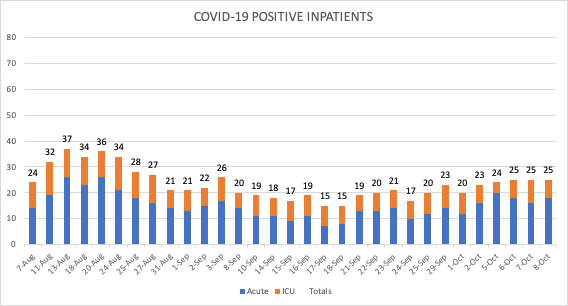Data Snapshot

UW Medicine Hospitals:
King County: The county reported 151 new positive cases and 5 new death on Oct. 7.
Washington: The state reported 91,208 cases and 2,177 deaths as of Oct. 7.
United States: The CDC reports 7,475,262 cases and 210,232 deaths as of Oct. 7.
Global: WHO reports 35,897,739 confirmed COVID-19 cases and 1,048,781 deaths as of Oct. 8.
*Numbers update frequently, please follow links for most up-to-date numbers.
COVID-19 Literature Situation Report
COVID-19 Literature Situation Report is a daily (M-F) newsletter put together by the Alliance for Pandemic Preparedness that provides a succinct summary of the latest scientific literature related to the COVID-19 pandemic.
Key Takeaways: COVID-19 Literature Situation Report Oct. 5, 2020
- Approximately three-quarters of people who required hospitalization for COVID-19 reported at least one lingering symptom or effect 3 months after their symptoms began. The most frequently reported effects were reduced quality of life (51%) and shortness of breath (50%). More.
- A multinational study reported that young people aged 18-30 years were more sensitive to negative effects of COVID-19 lockdowns and reported higher levels of anxiety, depression and uncertainty than older adults. More.
- The acceptance of flu vaccination in the 2020-21 season has increased in UK. An online survey showed that among people who previously had not routinely received influenza vaccination, 57% intended to get the influenza vaccine in the coming season. More.
- An ad hoc committee of the National Academies of Sciences, Engineering, and Medicine developed a framework for equitable allocation of COVID-19 vaccine. The framework includes four allocation phases of prioritizing COVID-19 vaccine to the public based on risk-based criteria. More.
UW Medicine in the News
U.S. News and World Report: Toilet Etiquette to Reduce Coronavirus Spread
Featuring: Carmen McDermott, Clinical Instructor, UWSOM
“Fecal-oral transmission is known to spread viral infections like hepatitis A. ‘COVID is a new illness from a new virus,’ says Dr. Carmen McDermott, an internal medicine physician, hospitalist and a faculty member in the residency program at Providence Sacred Heart Medical Center in Spokane, Washington. She is also a clinical instructor at University of Washington School of Medicine and co-author of a recent evidence review on potential hospital exposure. ‘But, extrapolating from other experience with closely related viruses, it was worth exploring the question and we proposed that it needed further research to clarify whether it was a concern.”’
The Seattle Times: Despite new restrictions, UW, Greek Row struggle to contain coronavirus
Featuring: Jeff Duchin, Allergy & Infectious Diseases
“UW has been testing students off and on campus. The university worked with the Greater Seattle Coronavirus Assessment Network Study, or SCAN study, and tested 1,256 Greek members between Sept. 8 and Sept. 20, before they moved into their houses, and found four positive cases. The Husky Coronavirus Testing program, which launched Sept. 24 in collaboration with the Seattle Flu study, has tested 2,413 students on the Seattle campus with 2.1% testing positive, according to the university’s coronavirus dashboard. UW Medicine tested 1,620 students living in residence halls between Sept. 22 and 25 and found five positive cases. UW Greek alums and house corporation boards should help their chapters take the steps necessary to prevent the spread of COVID-19, said Dr. Jeff Duchin, Public Health – Seattle & King County’s public health officer, wrote in a blog post on Public Health Insider.
‘We don’t want to see this spread to the greater UW community or surrounding areas or threaten our ability to have in-person learning in the future,’ he wrote.”
KOMO News: Seattle’s playgrounds reopening with new COVID-19 safety guidelines
Featuring: Paul Pottinger, Allergy & Infectious Diseases
“The parks department wants to make clear that equipment is not regularly sanitized or cleaned. The virus can linger on surfaces, though the bigger concern is too many kids playing too close together.
To keep the slides and swings as safe as possible, parks officials want no more than five kids on each piece of equipment at a time. Families are advised to wash their children’s hands before and after playing. Children ages 2 and older will be required to wear a mask, though there are some exceptions. And even with all these measures, people are still asked to keep at least six feet apart.
The parks department worked out these guidelines with input from public health, but there are still risks. For one, coronavirus has been shown to survive on surfaces, and that could include playground equipment. ‘You’re very unlikely to catch it from the environment if you keep your hands clean and if you prevent yourself from touching your own face,’ said Dr. Paul Pottinger, an infectious disease expert with UW Medicine.”

